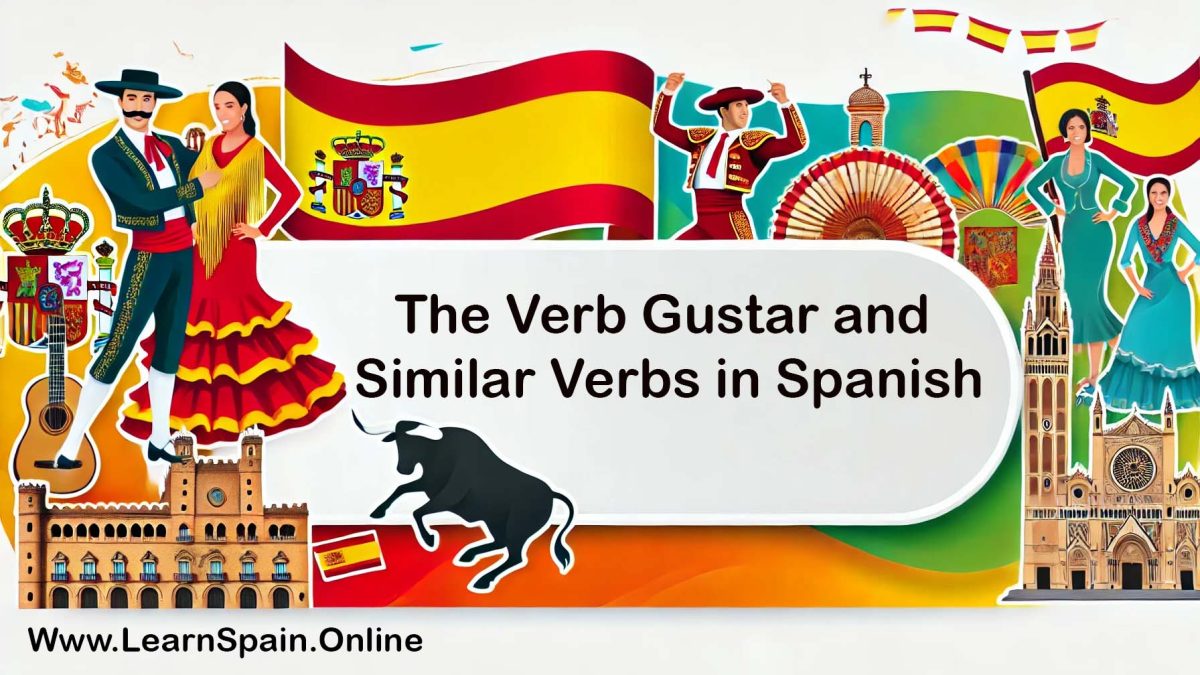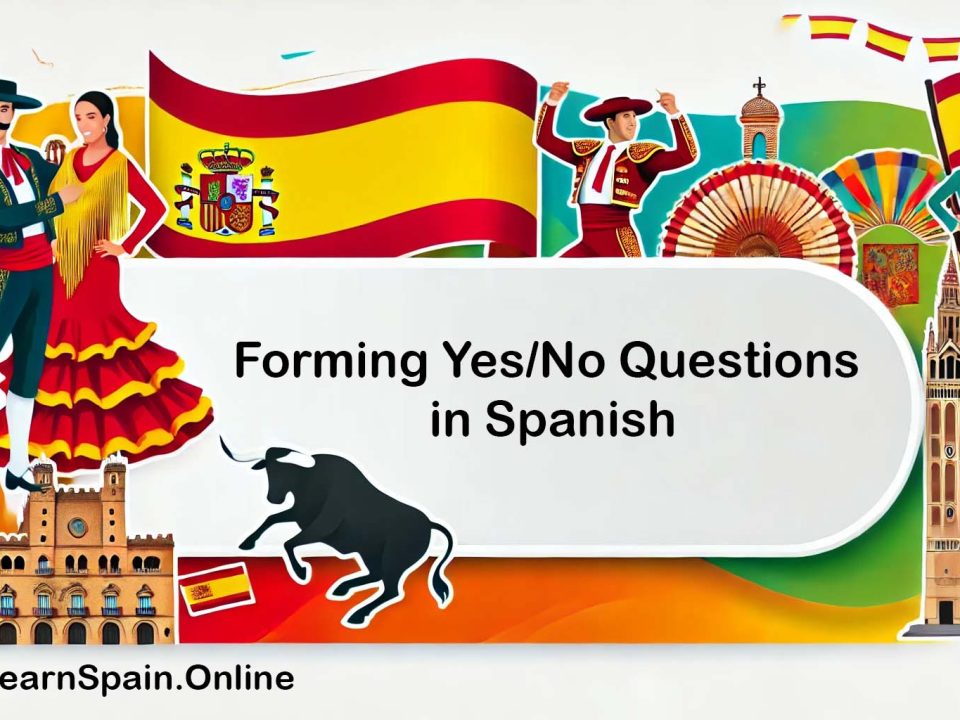
Basic Prepositions in Spanish: A Comprehensive Guide
July 17, 2024
Introduction to the Past Tense (Preterite) in Spanish
July 22, 2024The Verb Gustar and Similar Verbs in Spanish: A Comprehensive Guide
Understanding the verb “gustar” and other similar verbs is crucial for achieving fluency in Spanish. These verbs differ from typical conjugation patterns and often require a different sentence structure. This comprehensive guide will cover the basics of “gustar,” its conjugation, usage, and other similar verbs. We’ll also provide numerous examples to help you master their usage effectively.
The Verb Gustar
The verb “gustar” translates to “to like” in English, but its construction in sentences is quite different from English. Instead of saying “I like something,” in Spanish, you say “something pleases me.” The structure places the subject as the thing being liked and the object as the person who likes it.
Conjugation of Gustar
“Gustar” is typically conjugated in the third person singular or plural, depending on the subject (the thing that is liked).
- Singular: gusta
- Plural: gustan
Pronouns Used with Gustar
The indirect object pronouns are used with “gustar” to indicate who likes something. Here are the pronouns:
- Me: (to) me
- Te: (to) you (informal)
- Le: (to) him/her/you (formal)
- Nos: (to) us
- Os: (to) you all (informal, used in Spain)
- Les: (to) them/you all (formal)
Basic Sentence Structure
The basic structure of a sentence using “gustar” is:
[Indirect Object Pronoun] + [Form of Gustar] + [Subject]
- Me gusta el libro. (I like the book.)
- Te gustan las flores. (You like the flowers.)
- Le gusta la música. (He/She/You like(s) the music.)
- Nos gustan los perros. (We like dogs.)
- Os gusta la película. (You all like the movie.)
- Les gustan los gatos. (They/You all like cats.)
Examples with Gustar
- Me gusta estudiar español. (I like studying Spanish.)
- Te gustan las montañas. (You like the mountains.)
- Le gusta cocinar. (He/She likes cooking.)
- Nos gusta viajar. (We like to travel.)
- Os gustan los libros de aventuras. (You all like adventure books.)
- Les gusta la playa. (They like the beach.)
Expressing Dislikes with Gustar
To express dislikes, simply add “no” before the indirect object pronoun.
- No me gusta el brócoli. (I don’t like broccoli.)
- No te gustan los insectos. (You don’t like insects.)
- No le gusta esperar. (He/She doesn’t like waiting.)
Similar Verbs to Gustar
Several other Spanish verbs function similarly to “gustar.” These verbs also require the use of indirect object pronouns and follow the same sentence structure.
Encantar (to love)
“Encantar” is used to express that something is loved or is very pleasing.
- Me encanta la música. (I love music.)
- Te encantan los animales. (You love animals.)
Interesar (to interest)
“Interesar” is used to indicate interest in something.
- Me interesa la historia. (I am interested in history.)
- Le interesan los deportes. (He/She is interested in sports.)
Importar (to matter)
“Importar” means to matter or to be important.
- Me importa mi familia. (My family matters to me.)
- Nos importan nuestros amigos. (Our friends matter to us.)
Molestar (to bother)
“Molestar” means to bother or to annoy.
- Me molesta el ruido. (The noise bothers me.)
- Les molestan las interrupciones. (Interruptions bother them.)
Fascinar (to fascinate)
“Fascinar” is used to express that something fascinates or captivates.
- Me fascina la ciencia. (Science fascinates me.)
- Te fascinan los documentales. (Documentaries fascinate you.)
Examples with Similar Verbs
- Me encanta bailar. (I love dancing.)
- Le interesan las matemáticas. (He/She is interested in mathematics.)
- Nos importan los derechos humanos. (Human rights matter to us.)
- Te molesta el calor. (The heat bothers you.)
- Les fascina la tecnología. (Technology fascinates them.)
Common Mistakes and How to Avoid Them
- Incorrect Pronoun Use: Ensure you use the correct indirect object pronoun.
- Incorrect: Yo gusta el libro.
- Correct: Me gusta el libro.
- Subject-Verb Agreement: Make sure the verb “gustar” agrees with the subject (the thing liked).
- Incorrect: Me gustan el libro.
- Correct: Me gusta el libro.
- Omitting Pronouns: Always include the indirect object pronoun.
- Incorrect: Gusta la película.
- Correct: Me gusta la película.
Practice Exercises
To reinforce your understanding of “gustar” and similar verbs, try these exercises:
- Translate the Sentences: Write the Spanish sentences using the correct form of “gustar”:
- I like the movie.
- You (informal) like the books.
- He likes to dance.
- We like the beach.
- They like pizza.
- Complete the Sentences: Fill in the blanks with the correct verb and pronoun:
- __ (encantar) el chocolate. (I love chocolate.)
- __ (interesar) la política. (He/She is interested in politics.)
- __ (importar) la salud. (Our health matters to us.)
- __ (molestar) los mosquitos. (The mosquitoes bother you all.)
- __ (fascinar) los videojuegos. (Video games fascinate them.)
- Match the Verbs: Match the Spanish verbs with their English equivalents:
- Gustar
- Encantar
- Interesar
- Importar
- Molestar
- Fascinar
- To love
- To interest
- To bother
- To like
- To matter
- To fascinate
- Translate the Sentences: Translate the following sentences into Spanish:
- We love the city.
- She is interested in art.
- The noise bothers him.
- Science fascinates you.
- Family matters to them.
Conclusion
Mastering the verb “gustar” and similar verbs in Spanish is essential for expressing likes, dislikes, interests, and other feelings accurately. By understanding the structure and usage of these verbs, you can enhance your ability to communicate effectively in Spanish. Regular practice and application of these verbs will help solidify your understanding and build your confidence in using them.
Start incorporating “gustar” and similar verbs into your daily Spanish practice, and you’ll soon find yourself speaking with greater fluency and confidence. ¡Buena suerte! (Good luck!)


